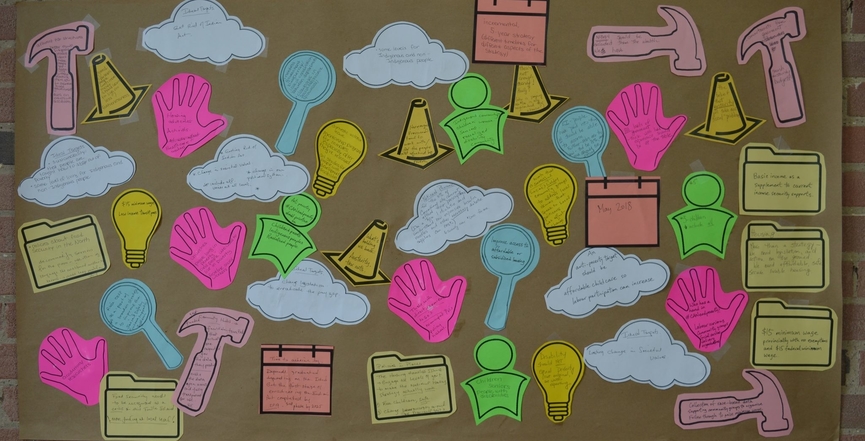According to the Canadian Centre for Policy Alternatives:
“Between 3.7 and 5.9 million Canadians lived in poverty in 2017. Food bank use went up from 860,000 in March 2016 to 1.1 million users in March 2018. About 35,000 Canadians are homeless on any given night and over 235,000 experience some form of homelessness during the year. Poverty rates are much higher among Indigenous people, recent immigrants, racialized people, senior women, single parents and people with disabilities.”
In August 2019, the federal government announced the country’s first poverty reduction strategy called, “Opportunity for All.” The goals outlined in the plan were so meek they had been reached before the strategy was released.
On March 20, Campaign 2000, a non-partisan coalition, contributed to the 25th edition of the 2020 Alternative Federal Budget (AFB), released by the CCPA. With COVID-19 and the combination of a global oil sell-off and the collapse of world financial markets threatening public health and safety as well as the Canadian economy, Campaign 2000 was not impressed by the federal government’s recent announcement of funding supports for children and their families living poverty.
Campaign 2000 believes it’s time to think beyond standard fiscal fixes and bank bailouts. Instead, it is calling for social solidarity, government leadership and expedient, non-partisan co-operation to do everything it takes to protect the public collective and govern as if all Canadians matter.
“The Canada Child Benefit (CCB) is one of the most important instruments of child poverty reduction,” said Leila Sarangi, national coordinator of Campaign 2000. “Government has announced a $300 increase to the CCB maximum payment per child, which represents a 4.5 percent increase, significantly less than the 15 percent increase they were promising for children under the age of one just a few weeks ago.”
Increasing the CCB would be an effective way to raise the incomes of families with children up to the after-tax low-income measure threshold at a time when the global pandemic is exacerbating economic inequalities.
Amending the Income Tax Act by repealing section 122.6 (e) tying eligibility for the CCB to the immigration status of the applicant parent and eliminating all wait times for the CCB would ensure families have immediate access to this benefit; as would providing easy web and telephone access to report decreases in income and adjusting the benefit paid without delay.
The government also announced a top up to the GST averaging close to $400 for single adults and $600 for couples. Unfortunately, there will be a waiting period for inadequate funds. Instead, Campaign 2000 would like the federal government to implement a targeted dignity dividend, providing $1,800 per adult and per child for those living below the poverty line. The dignity dividend would top up the GST credit to lift 450,000 people out of poverty, half of whom are children.
Canada also needs to comply with the Canadian Human Rights Tribunal ruling and stop discriminatory funding of child welfare services on reserve. The government should establish equitable delivery standards ensuring all children have access to federally funded support no matter where they live.
“All efforts should be made to ensure biological families, customary care families, kinship and foster families have the resources they need to care for children and youth.” said Rachel Gouin, executive director, Child Welfare League of Canada. “When families experience difficulties such as poverty, intimate partner violence, mental health issues and substance abuse with few social supports, children suffer greatly, especially in times of crisis.”
Campaign 2000 along with non-partisan groups Fight for $15 and Fairness and Workers’ Action Centre, are calling on the federal government to ensure a weekly minimum payment of $573 for all financial support programs during the pandemic and its aftermath. Whether administered through EI regular and special benefits, the Emergency Care Benefit or the yet-to-be released COVID-19 Emergency Support Benefit for workers who cannot access EI, $573 is the maximum weekly benefit under current EI rules.
It’s also imperative to implement strategies to ensure that people living in First Nation communities, remote communities and people with low incomes who do not have internet and personal computers have alternate access to application processes, such as telephone options.
Since the tax system is not universal, government needs to develop and implement strategies to reach individuals and families who have not filed for taxes, and therefore will not have access to these benefits.
Communications about these benefits must be accessible, in multiple languages, large font, American Sign Language and widely disseminated.
All wait times for all benefits should be eliminated to ensure individuals and families have immediate access to them.
Adopting the AFB 2020 actions would mark a significant shift in government policy-making and put the Canadian economy on more inclusive and sustainable foundations — without significantly adding to Canada’s debt, at a time when public debt is the least of the nation’s problems.
In that sense, the AFB is our bold new deal for an uncertain new decade.
When life returns to a new normal, the CCPA estimates that if the 2020 AFB were implemented, within two years every person in Canada would have an income that reaches at least 75 per cent of the low-income measure after taxes; the government would have developed a culturally sensitive anti-poverty strategy with Indigenous peoples; and the number of Canadians reporting both hunger and food insecurity would be halved.
Doreen Nicoll is a freelance writer, teacher, social activist and member of several community organizations working diligently to end poverty, hunger and gendered violence.
Image: Campaign 2000/Facebook




